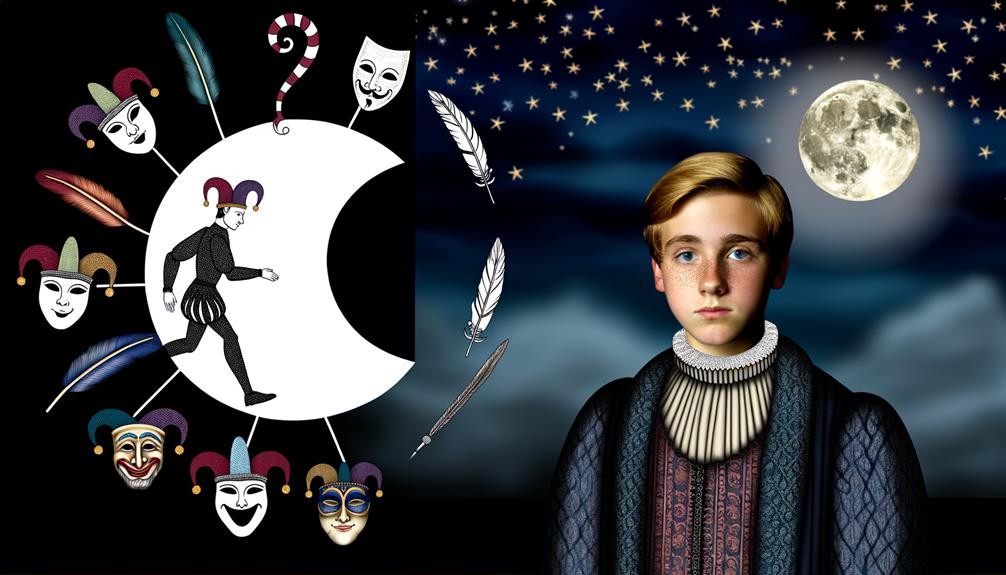Mercutio Name Origin and Meaning
The name Mercutio, deeply rooted in Renaissance literature, reflects ideals of humanism and individualism. Derived from the Latin "mercurius," it alludes to the Roman god Mercury, symbolizing eloquence and communication.
Shakespeare, influenced by classical mythology, crafted Mercutio's character in 'Romeo and Juliet' to embody wit, swiftness, and intellectual fervor. The suffix '-io' imparts a classical tone, while its phonetic structure mirrors the character's dynamic essence.
As a pivotal figure, Mercutio's presence enriches the narrative and poses existential questions about fate and human nature. To grasp a fuller understanding of Mercutio's layered significance, further exploration is essential.

Key Takeaways
- Mercutio's name is derived from the Latin word 'mercurius,' linked to the Roman god Mercury.
- Mercury symbolizes eloquence, communication, and swiftness, traits reflected in Mercutio's character.
- The suffix '-io' adds a classical resonance, enhancing the name's dynamic nature.
- Shakespeare's Mercutio embodies the god Mercury's wit and eloquence, enriching 'Romeo and Juliet.'
- The name Mercutio is a linguistic embodiment of mythological and literary origins, reflecting Renaissance ideals.
Historical Background
Mercutio's name, steeped in literary tradition, finds its roots in the rich tapestry of Renaissance literature and culture. The Renaissance, a period marked by a resurgence of interest in classical antiquity, saw an efflorescence of art, literature, and scholarly pursuits.
Within this context, Mercutio emerges as a character in William Shakespeare's 'Romeo and Juliet,' embodying the era's intellectual fervor and creative spirit. The creation of Mercutio, with his sharp wit and vibrant personality, reflects the Renaissance ideals of humanism and individualism.
Shakespeare's works, including the character of Mercutio, were deeply influenced by contemporary social, political, and cultural dynamics, making Mercutio not just a pivotal figure in the play, but also a reflection of the zeitgeist of the period.
Etymology of Mercutio
The etymology of the name 'Mercutio' can be traced back to the Latin word 'mercurius,' linked to the Roman god Mercury, symbolizing eloquence, communication, and swiftness. This root word, 'mercurius,' indicates qualities such as agility of thought and expressiveness, aligning with Mercutio's character in Shakespeare's 'Romeo and Juliet.'
The suffix '-io' often found in Latin names, adds a touch of classical resonance, further anchoring the name in historical and linguistic tradition. The phonetic structure of 'Mercutio' combines fluidity and strength, reflecting the dynamic and multifaceted nature of the character.
Therefore, 'Mercutio' is not just a name, but a linguistic embodiment of the traits associated with its mythological and literary origins.
Roman God Mercury
As the Roman god of commerce, communication, and travelers, Mercury embodies the qualities of swiftness, eloquence, and cunning, which are integral to understanding the etymological and thematic connections to Shakespeare's Mercutio.
Mercury, known for his role as a messenger among the gods, symbolizes agility in speech and movement. His attributes reflect the fluidity and dexterity required in trade and negotiation, traits that resonate in the character of Mercutio.
The god's association with travel and boundaries further underscores Mercutio's own boundary-pushing behavior and quick wit. These qualities not only inform the character's name but also his function within the narrative, providing a nuanced backdrop to his interactions and the thematic fabric of 'Romeo and Juliet.'
Shakespeare's Influence
Shakespeare's intricate portrayal of Mercutio draws heavily on the playwright's profound understanding of classical mythology and Elizabethan culture, seamlessly blending historical references with dramatic innovation. Mercutio's character embodies the mercurial nature of the Roman god Mercury, known for his eloquence and wit. This is reflected in Mercutio's rapid shifts in mood and speech, which captivate the audience.
| Element | Influence on Mercutio |
|---|---|
| Classical Mythology | Roman god Mercury |
| Elizabethan Culture | Social norms and humor |
| Language | Eloquent, quick-witted |
| Dramatic Innovation | Dynamic character shifts |
| Historical Reference | Contemporary societal roles |
Shakespeare's deliberate design of Mercutio not only enriches the narrative but also offers a vivid reflection of the complexities within human nature.
Literary Significance
Mercutio's role in 'Romeo and Juliet' serves as a pivotal element in the narrative's tragic trajectory, embodying the themes of fate and the capriciousness of life. His symbolic representation of freedom and wit contrasts starkly with the ensuing tragedy, thereby intensifying the dramatic tension.
Moreover, Mercutio's interactions and relationships with other characters notably influence their development and the unfolding of the plot, making his presence integral to the thematic and structural composition of the play.
Mercutio's Role in Tragedy
Integral to the tragic framework of 'Romeo and Juliet,' Mercutio's role serves as both a catalyst for the unfolding drama and a poignant commentary on the themes of fate and impulsive behavior. His vibrant personality contrasts sharply with the more serious protagonists, underscoring Shakespeare's exploration of human complexity.
| Aspect | Description |
|---|---|
| Catalyst for Action | Provokes Tybalt, leading to pivotal duels |
| Commentary on Fate | Derides the concept of destiny |
| Impulsiveness | Acts rashly, influencing Romeo's decisions |
| Comic Relief | Balances the play's darker elements |
| Tragic Foreshadowing | Foresees the doom of the main characters |
Mercutio's untimely death marks a turning point, plunging the narrative into irrevocable tragedy. His actions and philosophies distinctly shape the storyline, revealing the precarious balance between humor and sorrow.
Symbolism and Themes Explored
Exploring the intricate symbolism and multifaceted themes within 'Romeo and Juliet,' one finds Mercutio's character to be a rich tapestry that delves deep into the existential questions of fate, mortality, and the duality of human nature.
His mercurial temperament and eloquent speeches, particularly the Queen Mab monologue, underscore the unpredictable and capricious nature of life.
Mercutio's untimely demise serves as a poignant reminder of life's fragility and the inescapable presence of death.
Moreover, his penchant for wit and wordplay juxtaposed with moments of profound seriousness highlights the duality inherent in human existence.
Through Mercutio, Shakespeare explores the tension between chaos and order, the ephemeral and the eternal, inviting readers to reflect on the complexities of human experience.
Influence on Other Characters
Through his dynamic interactions and vibrant personality, Mercutio profoundly impacts the development and actions of other characters in 'Romeo and Juliet,' serving as both a catalyst for key plot events and a mirror reflecting the complexities of their inner lives.
His provocative wit and skeptical view of love contrast sharply with Romeo's idealism, challenging and shaping Romeo's romantic notions. Mercutio's untimely death acts as a pivotal moment, propelling the narrative into tragic territory and escalating the feud between the Montagues and Capulets.
Moreover, Mercutio's relationship with Romeo and Benvolio underscores themes of loyalty and honor. By embodying volatility and unpredictability, Mercutio illuminates the passionate, often contradictory nature of human emotion, thereby enriching the play's exploration of conflict and consequence.
Modern Interpretations
In contemporary adaptations and analyses, the character of Mercutio has been reimagined to reflect modern societal values and cultural contexts. This reimagining often involves exploring themes of identity, gender fluidity, and social commentary, aligning Mercutio with contemporary issues.
For instance, some productions have portrayed Mercutio as non-binary or genderqueer, emphasizing the character's liminality and defiance of traditional norms. Additionally, Mercutio's witty and provocative dialogue is frequently leveraged to critique current social and political climates, resonating with modern audiences.
Such interpretations not only preserve Mercutio's original vivacity and complexity but also enhance their relevance and relatability. This dynamic character continues to serve as a potent vehicle for examining and reflecting upon the evolving human condition.
Conclusion
Mercutio, a name steeped in historical and literary significance, serves as a cultural tapestry woven with threads from Roman mythology and Shakespearean drama.
The etymological roots trace back to Mercury, the Roman god, embodying swiftness and eloquence, while Shakespeare's portrayal imbues it with complex human traits.
This multifaceted name, much like a prism, refracts myriad interpretations through the lenses of history, literature, and modern scholarship, underscoring its enduring relevance and rich narrative legacy.






